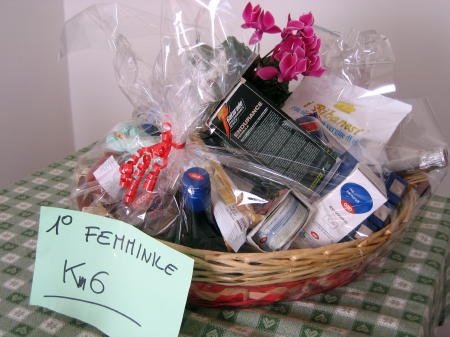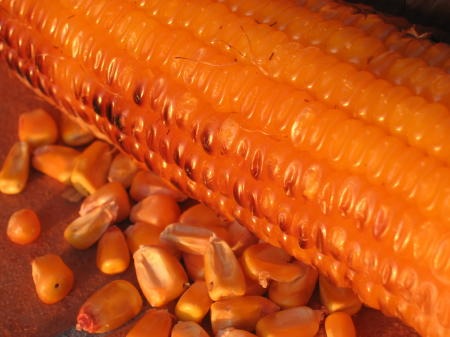
Here in Mareno we are surrounded now by the skeletons of the summer corn, brown brittle rows of stalks that stomp across the open fields for miles. On closer inspection I noticed that there are still ears still attached, burned black and dry from the sun.
“Why is there still corn here?” I asked Luciano. We were on a Sunday afternoon walk, actually a dangerous proposition in the middle of hunting season. I could see half a dozen men ambling across the dry fields with a rifle slung over a shoulder and a dog trotting at their heels. Occasionally we heard gunshots, saw a bird drop from the sky. We kept to the narrow road that snaked through the farmland.
“Dunno. I see it growing, then it is gone. That is all I know.”
Luciano does not often notice crop activity, nor is he a corn eater. For that matter, most Italians that I know are not. Well, it is certainly consumed on the form of polenta. But on the cob, right out of the garden? Never.
Not long ago friends of ours proudly showed us their new grilling set, with its long handled fork, scrapper and tongs.
“What are those?” I asked, pointing at an undisturbed corner of the carrying case, knowing full well what the objects were for.
“I have no idea; maybe for picking up olives?” Luigi took out a tiny cob holder, making a jabbing motion with the spike end. I then explained that they were devices to keep your fingers clean and cool while holding the steaming ears of corn. He shook his head.
“I never would have guessed that,” he mused as he clicked it back into place in it molded plastic bed. I imagine the set was not made for the Italian market.
All summer while in the US, Luciano suffers cheerful Americans serving the classic dish of steaming corn on the cob, sweet and dripping with butter. He has even been put to work shucking the stuff, yet another activity he has never been asked to do his entire life. There is a bigger inner struggle when it comes to eating what he just husked.
“Come on, try it.” I watch as Luciano picks up the buttered corn on the cob. He grimaces as if I were asking him to eat a bug, but because he is a polite guest, he eats it, only to admit his loathing later.
“I hate how it gets in my teeth. I have to deal with it for days and I don’t even like the taste. I don’t see the point.”
With this kind of reluctance it is not surprising that I never see it in the Italian supermarkets, on any menu, or for that matter, on our table. So I remain clueless to the purpose of the miles and miles of corn marching to the horizon in undulating rows in the crisp autumn sun of October. It must only be for polenta or, perhaps farm animals. One day, I would like to try it on the cob, straight out of the garden. I’ll bet it is delicious, being Italian and all.
The sun is lower in the sky, the markets are filled with chiodini mushrooms, my students are starting to think about studying English again (bless ‘em) and the fall festivals are gearing up. We finally got to the mushroom festival in Nervesa where they had pitched an enormous tent over the center piazza, incorporating the fountain that merrily spouted water. We sat on the hard benches, attempting to talk through the heavy air charged with screaming children, tinny loudspeaker music and laughter, while eating our fill of veal stew and sausages piled with nutty, woody mushrooms.
Being that Luciano is not a big fan of festivals, it surprised me one day when he asked me to keep the afternoon free last Sunday so we could go to another one. But he would not tell me what might be the featured food.
“I want it to be a surprise.”
“It’s not a tongue festival, right?”
“No, I would not do that to you.”
“Tripe?”
“Come on!”
Anna Maria and Giancarlo were joining us. He, to celebrate the victory of Valentino Rossi in the MotoGP motorcycle race, and Anna Maria because she will go out for anything. They knew it was to be a surprise and floated misinformation the whole way there.
“I think she would enjoy a pumpkin festiv..”
“Shhhh! It is a surprise!” Anna Maria hissed. Chastised, Giancarlo rolled his eyes. Luciano grinned quietly as we motored through the golden countryside and then slowed at the sign:
Welcome to the Lovadina, Home of the Corn Festival!
A corn festival? What on earth would they be cooking up in the back besides the ubiquitous polenta? We strolled into the tent past the carnival games and a line of chugging tractors pumping black smoke into the evening sky, like so many entries in an agricultural derby. Near the entrance of the tent sprawled a mountain of corn kernels, yellow, dry and hard. I reached down to pick up a handful as Anna Maria pointed to a wooden bench, with a grinding device attached to the front, which was settled into the display, up to its ankles in corn.
“I remember grinding corn for polenta with one of those. See? You throw the cobs in one end and turn the crank and the kernels are removed.”
“Gino from next door used to do that in the mornings. I remember la Nonna commenting on the noise,” Luciano added. The bag of resulting kernels was usually delivered to a neighborhood mill to render the hard nubs into flour. Quite a long process for something that is a much a part of the Italian diet as bread and pasta. Now we can pick it up pre-ground and even precooked without a thought at Mio Market and I am reminded how fast Italy has developed in the last forty years.
We were early and the tent was filled with children; the normal festival din swirled an octave higher that usual. In perusing the menu I could see that, besides a couple of traditional heavy farmer fare like polenta and beans, there was nothing particularly “corny” being offered. So I ordered ribs with, of course, polenta. Luciano kept swiveling around, looking for something at the edge of the tent. Meanwhile, I focused on the red wine that had arrived and then the steaming ribs.
Then I saw it.
A grill was being set up to roast, of all things, corn on the cob. This is why he brought me here. Two ladies dressed up, I think, to represent vecchi tempi or olden times, stood joking with the sudden line of customers. With an urgency I had never seen around any vegetable, Luciano rushed to get in line and returned with two ears, one for me and one for Anna Maria because she will eat anything. The corn was firm and hot, with perfect grill marks…and dry, very dry. But as I was on a mission and after all a reporter of some sort, I sunk my teeth into the cob. It was like biting into a door decoration. I chewed that bite for a good ten minutes as Luciano grinned at me, eyebrows raised.
“What do you think?”
“Wonderful. But I think I will take it home and use it for a centerpiece. Look, it is only missing this one bite.”
“Ok. Wrap it up. I am happy you liked it.” He had made his point.
Despite the lingering questions that now include why does anyone eat that stuff on the cob, thus ended the story of the Italian corn. Here it is clearly grown to be ground up into corn mush or poured into feeding troughs on farms throughout Italy. We will leave the cob eating to the Americans and I will certainly leave Luciano alone if he doesn’t want to pick the stuff out of his teeth.
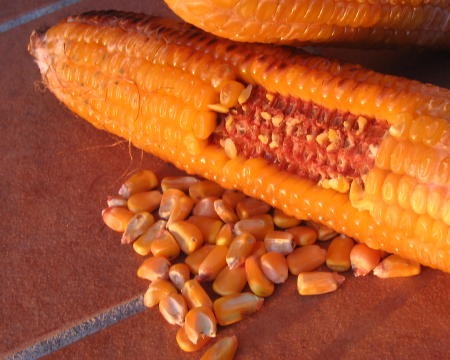

Last Wednesday Angelo Guzzi shrugged into his chunky coat and carefully fastened each of the fake tortoiseshell buttons. He caught his wife’s eye as she was vacuuming the living room floor, giving her a little wave. Because of a recent illness, Angelo could no longer speak and now communicated with nods and waves, a system that seemed to work for everyone. He then picked up the three plastic bags by the front door. The bottles in one of the bags clanked a little. Contrary to what his grandson insisted later, he did not forget his plaid full-sized umbrella and hooked it over his arm, quietly closed the solid wooden door, and stepped out into the stormy afternoon. It was the last anyone has seen of him.
Angelo’s short walk to take the bags of bottles, plastic and paper down to the recycling bins started over a week ago. First his wife called her sister-in-law down the street to see if he had stopped in for a glass of prosecco. He sometimes did that. But after that call, the quiet neighborhood was soon filled with concerned friends and family that spilled out into the narrow streets, bent against the sheets of rain that danced across the nearby fields. Finally the police were called, reports were taken, people were interviewed, and finally, shockingly, the irrigation ditches that ran along the roads were searched. The normally quietly gurgling man-made creeks were swollen with the recent rains and now surged angrily along the roads and out through the fields, where yellow-vested policemen grimly walked the next day, fanned out across the soggy stumps of the summer corn.
When nothing of Angelo was found in the cornfields, the hunt moved closer to the banks of the nearby Piave, the river that meanders throughout the countryside and history of the Veneto. In the thin Friday morning sun, yellow-vested men gingerly poked among the tangled brambles on the rough river bank. While the Piave is usually a placid river, the roiling brown water had just receded from the storms and the bushes and scrub along the banks had hooked all manner of mud-cloaked debris, making the search all the more unpleasant, yet completely fruitless with no sign of Angelo. However, their arrival at the banks of the Piave unearthed some very important clues: A ranger had seen a man fitting Angelo’s description walking down the dirt road near the river that Wednesday evening. The ranger, concerned for the pedestrian’s safety, suggested that he not continue down that road. The man had waved in agreement and then turned and walked in the direction from which he had come. The ranger had forgotten all about the incident; at least until the search teams showed up.
Ominously, and calling into question the grandson’s observational skills, Angelo’s full length plaid umbrella, neatly furled and strangely clean, was found lying on the very road that the ranger had told him not to travel. Had Angelo returned when the ranger was gone? This being the first concrete clue of Angelo’s whereabouts, the police intensified their search of those snarled muddy banks. Later that same afternoon, Angelo’s chunky coat with the fake tortoise shell buttons was found, empty.
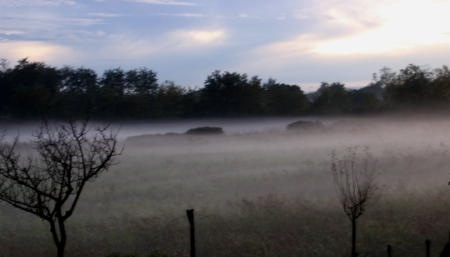
I had seen the searchers along the river, their neon bright vests making them easy to spot as I motored across the river to work. The fact that this man disappeared, only a kilometer from our house, while doing something as mundane as taking out the trash bewilders me. We walk down the street all the time with the recycling. Do I need to tie a rope around Luciano? Why did he go out for a walk in that storm and how could it be that the police are now looking for him over 5 kilometers away? Why did he walk down the road when the ranger told him not to?
Luciano gently explained that some people are speculating that he had committed suicide, perhaps by jumping into the river. After his illness, he had become despondent and depressed. The doctor had just told him that he had found yet another tumor…
I don’t want to accept this easy answer. I think in fact that Angelo had been plotting his escape for years. Escape from the stifling little neighborhood where everyone knows each other, routines are rock solid and nothing, nothing, changes. The grandson does not understand him, his wife looks right though him and he can no longer speak.
~~~
After waving goodbye to his wife, who was more interested in getting the dust bunnies under the sofa than noticing the beautiful violence of the bulging storm clouds overhead, Angelo strode out into the rain. He tossed the three bags at the enormous bins, pointedly not separating the paper and plastic, and briskly turned in the direction of the Piave. After getting the attention of the ranger, he slipped back down the dirt road where he carefully placed his umbrella in the path of the expected search party. He would miss that umbrella, so sturdy and well-built, a thing of the past. His sparse hair whipped wildly in the wind as he quickly walked a few more meters down the road and slipped out of his coat and laid it in the mud. The coat he would not miss. Underneath it he was wearing a light raincoat that nevertheless stopped the slicing rain as it pelted against his bent body. With numb fingers he pulled a car key out of its pocket.
In the rapidly approaching dusk and the family’s confusion five kilometers away, Angelo was easily missed stepping into the nondescript car that had sat unnoticed since the day before, tucked into a thicket of bushes along the muddy road. Firing up the noisy, but energetic Fiat in the gathering darkness, Angelo gave one last look at the sodden fields and the boiling river before speeding off into the night. These were things he had looked at his entire life. He had a plane to catch and the one way ticket to Rio was burning a hole in his p-..
“No, that is not possible,” blurted out Anna Maria, “He left his documents at the house. And his name is not Angelo”
Sigh.
…Angelo gave one last look at the sodden fields and the boiling river before speeding off into the darkness. These were things he had looked at his entire life. He was sure he could make it to Ancona before the gas ran out. The ferry to Greece left at dawn and he knew a person who knew a person…

(picture courtesy of Marcel Germain)
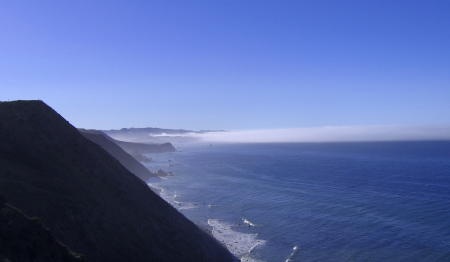
This story spans three months and two continents, involves the generosity of my husband, cool stuff from lost and found, cast-offs from my sister and some dumb luck. All pretty important elements to a summer of unprecedented running success.
Almost as soon as we landed in California, Luciano presented me with a surprise: a new Ipod shuffle. As big as a postage stamp, I had never seen anything so cute and technological at the same time. Clipped to my hat, the source of my music is virtually invisible and I can control the soundtrack in my brain with a touch to the back of my head. Although he got it because he was mortified to be seen with me using my previous music source strapped to my arm, I cared little, switching on my music, tap, like that, the very epitome of California know-how. How appropriate as we re-adjusted to life just north of Silicon Valley.
Every year we leap into the summer by running in and volunteering for races organized by PCTR (Pacific Coast Trail Runs), a family-run operation consisting of ultrarunners Sarah, Wendell and their long suffering 13-year-old, Aaron. Still recovering from jet lag, we drag ourselves out of bed to get to the Angel Island race where we volunteer, shivering in the pre-sun fog as we set up tables of delicious junk food for the runners. So many people showed up this time that Wendell was scrambling to get two ferries filled and to the starting line in time. He gets quieter as he stresses out and should be left alone. His wife Sarah seems to get even more jovial as things get dicey and Aaron is morose as he rolls his eyes at me. “Oh, no, you are back,” he moans, though I know he is happy to see us and that he enjoys himself at these races. It’s not cool to show too much enthusiasm when you are thirteen.
This year from that very race some unlucky runner left behind a couple of water bottles fitted out with mesh handles. Knowing that a formal Lost and Found does not exist, and hating to throw things away, I took them home and tried one out with a powdered energy drink we had won in a raffle. More dumb luck. Holding that bottle of raspberry liquid protein and electrolytes, trotting along the trail with the music in my head keeping up with the rhythm of my feet, I felt like an ultra runner prepared to, no, aching to run 100 miles that morning. I was so cool…and, dressed in some flattering running tights that my sister no longer wanted, I was unstoppable. I ran my 4 kilometer loop without breaking a sweat. I was on fire!
The last coup was a birthday present from Luciano: a pair of new running shoes. I will not bore you with the ridiculous drawn out process of my choosing these shoes. Suffice to say it involved two returns and three trips…no, four to the shoes store. That last trip I went with my new shoes concerned that the heel was still loose. Luciano tagged along because he likes to just be in the store, absorbing the running essence that oozes from the clothes and shoes on display. The employees know him by name and are used to him hanging around, but were probably annoyed to see me show up, again, with shoe doubts.
“You see, I really like these shoes, but the heel is loose. Do you think I need a smaller pair?” Did I detect an eye roll?
“Have you tried doing the laces up differently? You can pull up a lot of slack by doing it this way.” Beverly started to re-lace my shoes when Luciano wandered over.
“Oh, I know how to do that. See? that's how my shoes are tied.” I gave him a super dirty look. Now he knows? Couldn’t he have remembered this gem of information before?
For the race at Salt Point on the Mendocino Coast I packed up all my gear: hydration bottles, music, tights, shoes and put some of that magic powdered drink in a plastic baggie. And because we were staying two nights, I also packed up ingredients for making a pizza on the grill: sauce, dough, cheese and some flour in a plastic baggie. We drove up the undulating coast reveling in the beauty of the late summer sun on the golden hills, craggy green cliffs and sparkling Pacific Ocean.
The next morning I was over-prepared to run my 11k through the hills and meadows and along the crashing waves at the beach. At the starting line I laced up my shoes properly, clipped on my music, tied up my speedy running tights and pulled out the baggie to make up my magic juice. As I stirred the water into the bottle it did not turn the normal bright Dye #2 red, but remained pasty white. Hmmmm. Crap, I had grabbed the baggie of flour! Now I had to run without one of my props! But I did it anyway, shaving a full 22 minutes off my last year’s time, and enjoying almost every minute of it.
“What’ja do last year, crawl?” Aaron groused.
“Maybe. Hey, tell me about school. It starts soon, doesn’t it?
“Yeah. I guess I am happy about that…”
And we sat near the finish line on the green grass cliff in the late afternoon sun with the waves crashing at our toes and Fall nipping at our heels, talking over all things important while waiting for summer to gently end.

(Aaron, trying to break a land speed record)
~~~
The sun is comfortably warm on my back as I shuffle down Strada Nuova. We have returned to Mareno (suddenly, it always seems) and I am going down to see the latest batch of baby goats. Anna Maria has been going on about them which is unusual for her, their being goats, and I think I should be able to report back what is so special.
Returning as we do ever year at the moment between seasons, it is easy to see the transition. Last year the grapes came in before we did, so we missed the harvest and the Fall seemed a little…empty. This year however, tractors rattle past our window laden with the grapes from the harvest. As we hear them approach we call out predications on the color.
“Red!”
“White! I win!” I called out as tractor buzzes by, pulling a cart piled with the grass green grapes. The mound bounces voluptuously with the abrupt movement of the tractor as the driver stands at the controls for a moment to adjust his coveralls.
The baby goats are no longer babies, but more sullen teenagers and I discovered that the reason for the interest is that there are eight of them. I hate to appear jaded, but that goat’s fertility is a forgone conclusion for me after her brood of ten last Spring. Nevertheless, I report back to Anna Maria that I have seen them and they are indeed numerous.
Three days after our return, at six-thirty Sunday morning, I opened one eye to check the weather. After a triumphant summer of smashing personal running records, I have a newfound confidence…well, let’s say I was feeling cocky about running and that race in San Fior seemed to be a good idea to shake off the jet lag. But from bed I could see rain pelting the windows and the trees across the street swaying in the wind. Rats. Normally on days like these I choose to stay in bed, but I had this cockiness thing…
I stood, pretty unhappily, with the small group of wet runners huddled at the starting line, holding my head down to keep my hat from blowing away. At the bang! of the unnecessarily loud starting gun, I ran off into the rain as Luciano took off on his 12K. The course took us through the usual narrow cobblestone streets, past your standard villa, along the rain-swollen river and through a soggy forest. As usual, I was running alone most of the time except for a man who was wearing short shorts, heavy cologne and carrying an umbrella. I kept passing him to get away from the cologne, but he caught up on the downhills (he had pretty long legs) and I felt like I was stuck in his perfume turbulence way too long.
Head down, I doggedly trotted along through the grey morning. As I neared the end I was running alone again, but noticed that it was strangely deserted at the finish line. Thinking all the finishers had hustled on home to get out of the cold, thoughts went through my mind to just stop at the car and call it a day. But I felt pretty good, so I kept on going. Shuffle, shuffle, shuffle. Suddenly a woman's voice came over the loudspeaker, "Attention! We have the first woman finisher of the 6K arriving now!" I was shocked as heads turned my way and I almost stopped to see who they were talking about. I was alone. I crossed the line, winning my first race, ever. A little 6K race.
Abruptly I was surrounded by race officials asking for my name and registration.
"You are kidding me, right?" I said.
"No, you won. Congratulations!"
I think it is because all my competition slept in that morning, not the least of which the three other women in our running group who are super fast. But as Luciano said, I got out of bed and that made all the difference.
